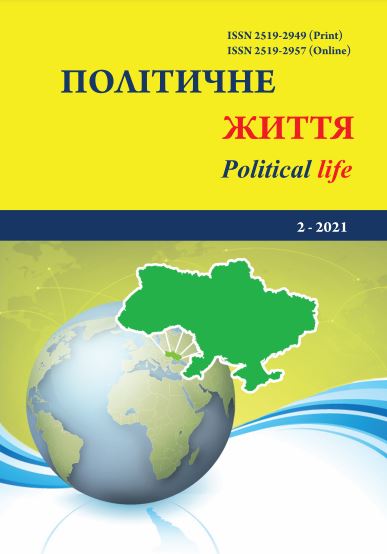Study of the Influence of the "Crimean Crisis" (2014) on the International Legal Order Through the Prism of Realpolitik as a Political Philosophy
DOI:
https://doi.org/10.31558/2519-2949.2021.2.1Keywords:
«Crimean crisis»; international legal order; realpolitik; annexation of the Russian Federation to the Crimean peninsula; Russian-Ukrainian armed confrontation; EU; NATOAbstract
A comprehensive analysis of the influence of the Crimean Crisis (2014) on the international legal order through the prism of realpolitik was carried out in the article. There is the lack of realpolitik in the foreign policy and defence strategies of Western Europe and the idealistic vision of the European community of world order development in the XXI century provoked gross violations of international law by the Russian Federation. It is noticeable that Moscow annexed part of Ukraine's territory with bilateral violation and multilateral agreements. The existing system of guarantees for the Ukraine's territorial integrity protection (Budapest Memorandum) undermined the established international legal order and dealt a significant blow to the reputation of West, which did not provide Kyiv with adequate support in protecting the territory and restoring its integrity. Doubtless, the problem of studying the impact of the Crimean crisis on the international legal order became especially relevant due to the need to improve the use of key postulates of political realism and realpolitik to understand the actions of geopolitical players towards Ukraine in the period before and after Russia's annexation of the Crimean peninsula 2014.
The method of studying the issue of the "Crimean crisis" on the international legal order through the political philosophy – realpolitik.
To draw the conclusion, one can say that the Crimean crisis of 2014 is not only local as well as threatens the unity of the EU, and has demonstrated to the world the imperfection of international legal norms based on political idealism, when it comes to protecting the national interests of major powers and consolidating areas of geopolitical influence.
References
Kissinger H. To Settle the Ukraine Crisis, Start at the End. Washington Post. Mar. 5, 2014. URL: http://www.washingtonpost.com/opinions/henry-kissinger-to-settle-theukrain...start-at-the-end/2014/03/05/ 46dad868-a496-11e3-8466-d34c451760b9_story.html.
Mearsheimer J. Why the Ukraine Crisis is the West’s Fault: The Liberal Delusions that Provoked Putin. Foreign Affairs. Sep./Oct. 2014. URL: https://www.foreignaffairs.com/articles/russia-fsu/2014-08-18/why-ukraine-crisis-west-s-fault.
Scott Sh. International Law as Ideology: Theorizing the Relationship between International Law and International Politics. EJIL. 1994. 5. P. 313-325. URL: http://www.ejil.org/pdfs/5/1/1245.pdf.
Меморандум про гарантії безпеки у зв’язку з приєднанням України до Договору про нерозповсюдження ядерної зброї (Прийняття 05.12.1994). URL: https://zakon.rada.gov.ua/laws/show/998_158#Text .
Delahunty R. & Yoo J. Great Power Security. CHI. J. INT'L L. 2009. N.10. Р. 35-37. URL: http://scholarship.law.berkeley.edu/facpubs/41
North Atlantic Treaty Organization, Bucharest Summit Declaration. Apr. 3, 2008. URL: http://www.nato.int/cps/en/natolive/official_texts_8443.htm.
Russia Denies Naval Bases Report. BBC News. Jan. 16, 2009. URL: http://news.bbc.co.uk/2/hi/europe/7833544.stm.
Tomlinson Ch. Realpolitik in the International Energy Markets. Houston Chronicle. July 10, 2014. URL: http://www.houstonchronicle.com/business/outside-theboardroom/article/Realpolitik-in-the-international-energy-markets-5611807.php.
Krasner St. Structural Causes and Regime Consequences: Regimes as Intervening Variables. International Organization. 1982. Vol. 36. No 2 (Spring). International Regimes. P. 185-205.

